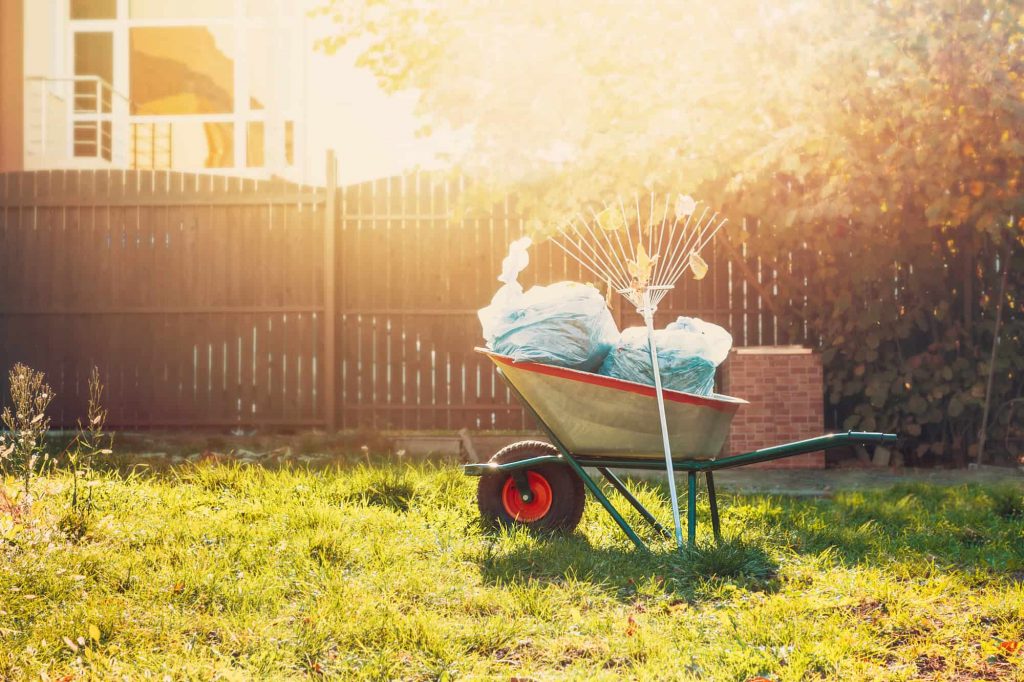
If you’re like most Americans, your New Year’s resolutions include at least one practical goal like “getting organized.” You may have thought about putting your home, your calendar, and your bills in order, but what about your yard? With the help of a HomeAdvisor blog on getting rid of waste the right way, we’ve culled nine great eco-friendly ways to clean up your yard for the New Year.
When you think about home waste, plastics, glass, and aluminum may come to mind. In reality, yard trimmings contribute more waste in the U.S. than either glass or metal—and nearly as much as plastics. Even though yard debris is natural, it can negatively affect the environment when thrown in landfills. As waste accumulates and organic matter decomposes, landfills release the greenhouse gas, methane.
So, by tackling your yard trimmings in an eco-conscious way, you can get a jumpstart on two potential New Year’s resolutions: to clean up your yard and reduce your carbon footprint. The following suggestions—organized into the broad categories, “reduce,” “repurpose,” and “remove”—will help you do both.
Reduce the Amount of Yard Waste You Produce
As anyone familiar with the “reduce, reuse, recycle” mantra knows, the most eco-friendly way to dispose of something is to limit how much you need to dispose of in the first place. The three practices below can help you nip yard waste in the bud.
- Follow proper mowing and pruning practices: Trimming your plants correctly not only improves their health, but can also reduce waste. Proper pruning helps prevent pests and disease, for example, potentially reducing dead plant material down the road. If you’re itching to get started on your yard cleanup in winter, the colder season can actually make an ideal time to prune dormant trees, bushes, and shrubs.
- Steer clear of pesticides: While chemical pesticides may seem easier in the short run, they have a number of negative side effects. In addition to potentially harming plants, beneficial bugs, and the environment, treating your yard with chemicals makes it more difficult to dispose of waste in an eco-friendly way.
- Avoid over-watering and over-fertilizing your yard: Over-watering and over-fertilizing your yard produces environmental waste of a different sort. Excess fertilizer runoff can contaminate groundwater and pollute bodies of water, killing fish and creating harmful algal blooms. Using more water than needed (such as irrigating during windy conditions or in the heat of the day) hurts the planet and your wallet.
Repurpose Your Yard Waste at Home
You may have thought about reusing plastic bags or repurposing old clothes, but what about recycling your yard waste? Fortunately, your yard offers plenty of opportunities to turn trash into something useful. The following suggestions can help you reduce waste and save money at the same time.
- Compost your yard waste: Composting recycles organic matter, converting yard waste into nutrient-rich material that helps your plants grow better. Not only does composting remove waste from landfills, but it can also save you money (and prevent more waste) by reducing your need for commercial fertilizer and soil. All you need to do is combine “brown” material (like twigs and leaves) and “green” material (like grass clippings and fallen fruit) with air and oxygen, and allow it to decompose naturally.
- Convert yard waste into mulch: Mulching your plants has innumerable advantages, including conserving water, reducing erosion, limiting weeds, and protecting roots from heat and cold. Rather than purchasing commercial mulch, you can create your own out of yard waste. Almost any kind of scraps—tree bark, branches, leaves, grass clippings, and shrubs—can become mulch, but you may need to use a wood chipper or hire a professional tree trimming service for some of the larger items.
- Grasscycling: A kind of hybrid between mulching and composting, grasscycling reduces waste while feeding and protecting your lawn. The best part is that it also means less work for you. Instead of collecting and bagging your clippings, you just leave them in the grass where they fall. By cutting no more than one inch at a time, the trimmings won’t harm your lawn and instead will return nutrients to the soil—limiting the need for fertilizers—and reduce thatch and weed buildup.
Remove Your Yard Waste
When you can’t reduce, recycle, reuse, or repurpose all your yard waste at home, removing it is always an option. While a landfill should always be a last resort, sometimes other organizations or individuals can recycle or repurpose your yard waste for you.
- Donate it to a neighbor or community garden: As they say, one person’s trash is another person’s treasure. If you don’t have enough time—or you have too much yard waste—to handle it on your own, consider donating it to a neighbor or local community organization that could use compost or mulch for their garden.
- Drop it off at a collection site: Some cities and towns (like the City of Vancouver) have composting facilities or other collection sites for yard waste. You may even find some special free services such as free leaf disposal programs.
- Have it picked up at your home: Check around to see if your community offers curbside yard debris collection, bulky item pickup programs, or special waste removal containers for organic materials. If you can’t find a regular service, you may want to hire a yard waste removal company for a one-time (or seasonal) pickup.
Conclusion
Whether you plan a big yard make-over or want to take it step by step, these nine tips can help you clean up your yard for the New Year. If you need a little help, visit HomeAdvisor to find top-rated yard clean-up services in your area.